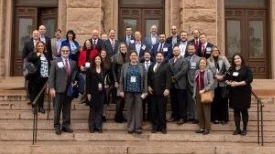To Tax or Not to Tax:
Should PPP Loans That Are Forgiven Under Federal Law be Subject to the Texas Franchise Tax?
By David E. Colmenero, CPA-Dallas
February 2021
Among the many issues confronting taxpayers, legislators and the Texas Comptroller related to COVID-19 is whether Paycheck Protection Program (PPP) loans forgiven pursuant to federal law should be subject to the Texas franchise tax. Federal legislation enacted last spring provides that the portion of those loans used for qualifying purposes are eligible for forgiveness. See Coronavirus Aid, Relief, and Economic Security Act (“CARES Act”) (March 27, 2020), sec. 1106(b). The CARES Act also states that, for purposes of the Internal Revenue Code, those forgiven loan amounts are excluded from gross income. See id. sec. 1106(i). The Consolidated Appropriations Act enacted late last year, which amended the CARES Act, similarly states that “no amount shall be included in the gross income of the eligible recipient by reason of forgiveness of the indebtedness….” See Consolidated Appropriations Act of 2021, (Dec. 27, 2020) sec. 276(a). As it relates to partnerships and S corporations, the Consolidated Appropriations Act of 2021 adds that these forgiven loan amounts are treated as “tax exempt income for purposes of sections 705 and 1366 of the Internal Revenue Code of 1986.” See id.
Given that the Texas franchise tax base is largely derived from gross income amounts reported on a taxpayer’s federal income tax return, the fact these forgiven loan amounts do not constitute taxable gross income for federal income tax purposes might lead some to believe they should not be income for Texas franchise tax purposes either. Members of the Texas Comptroller’s office have suggested, however, that the portion of PPP loans that are forgiven must nevertheless be included in total revenue for Texas franchise tax purposes.
Recently, two companion bills were filed in the current Legislature that would amend the Texas Tax Code to state that total revenue does not include any amount of loan forgiven under the federal Paycheck Protection Program. (HB 1195 and SB 372). But are these bills necessary? The language in Chapter 171 of the Texas Tax Code dealing with the franchise tax suggests there may be a way to read the Texas Tax Code so that these forgiven loan amounts are not subject to Texas franchise tax. This may indeed reflect the better reading of the Tax Code.
The Texas Comptroller’s view to the contrary appears to be based on Section 171.0001(9) of the Texas Tax Code which defines “Internal Revenue Code” as “the Internal Revenue Code of 1986 in effect for the federal tax year beginning on January 1, 2007, not including any changes made by federal law after that date, and any regulations adopted under that code applicable to that period.” Tex. Tax Code sec. 171.0001(9). This has, in fact, provided the statutory basis the Texas Comptroller has cited to for denying certain other benefits created under federal income tax law after that date, such as bonus depreciation. See, e.g., Internal Comptroller Memo (Jan. 30, 2014), Access. No. 201401856L.
The language in the Texas Tax Code suggests, however, that total revenue is based on amounts actually entered on designated line items of a taxpayer’s federal income tax return for the respective accounting period rather than amounts that would have been entered under the earlier version of the Internal Revenue Code. Section 171.1011 of the Tax Code, in particular, states that total revenue is equal to the “amount[s] reportable” on specified line items of Internal Revenue Service forms, including IRS Form 1120 and IRS Form 1065. See, e.g., Tex. Tax Code sec. 171.1011 (c)(1)(A), (c)(2)(A), (c)(3). It states further that an “amount reportable” is the “amount entered to the extent the amount entered complies with federal income tax law.” See id. sec. 171.1011(b). In this context, the Texas Tax Code focuses on “amount[s] entered” on the respective federal income tax forms as the starting point in computing total revenue. See id. There is no reference in this context to the Internal Revenue Code as defined in Section 171.0001(9).
Reading the Texas Tax Code as referring to amounts actually entered on a taxpayer’s federal income tax return does not necessarily render reference to the Internal Revenue Code of 2007 in Section 171.0001(9) meaningless. There are several places in the Texas Tax Code that specifically refer to the Internal Revenue Code, which may perhaps in those specific instances be properly construed as referring to the 2007 version. But the provisions that refer to amounts entered on specific line items of a federal income tax return as the starting point in computing total revenue make no such reference.
For this reason, there is at least a question as to whether total revenue should include PPP loan amounts that are forgiven under federal law. If those amounts are properly excluded from gross income on the specific line items of a taxpayer’s federal income tax return that comprise total revenue, there may be a valid question as to whether they should be reported on a Texas franchise tax report. Ultimately, this may be a moot point if either HB 1195 or SB 372 become law. Otherwise, this issue may need to be resolved by the State’s judiciary.
David E. Colmenero, J.D., LL.M., CPA is a partner at Meadows Collier in Dallas. He practices primarily in the State Tax Controversy and Litigation, and State Tax Planning areas. If you have questions about this article or any state tax related matter, please feel free to contact David Colmenero at (214)749-2462 or dcolmenero@meadowscollier.com
